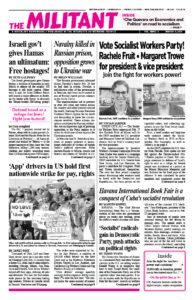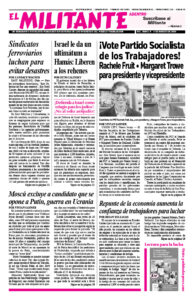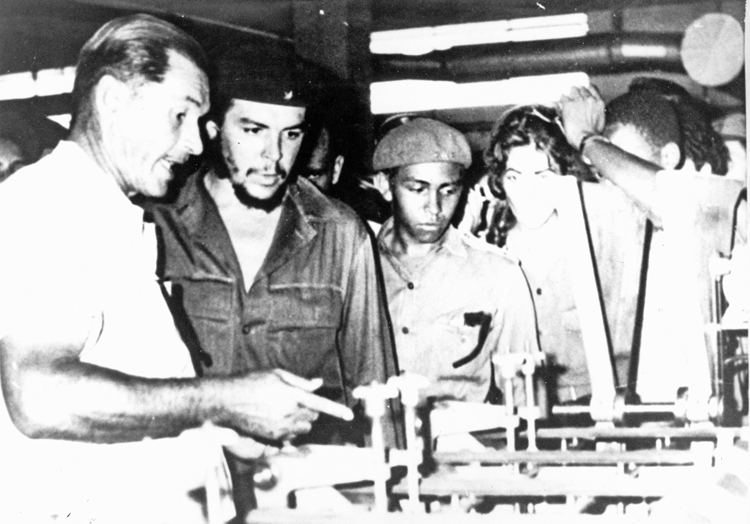This is the Editor’s Note by Mary-Alice Waters to the new Pathfinder Press expanded edition of Che Guevara on Economics and Politics in the Transition to Socialism by Carlos Tablada. Tablada received the Special Prize from the Cuban cultural institution Casa de las Américas for the first edition of the book in Spanish. Waters is president of Pathfinder Press and a National Committee member of the Socialist Workers Party. Copyright © 2024 by Pathfinder Press. Reprinted by permission.
What I ask for modestly is that Che’s economic thought be made known. That it be known here, in Latin America, in the world — in the developed capitalist world, the Third World, the socialist world. The author of this book compiled, studied, and presented the essence of Che’s economic ideas, retrieved from many speeches and writings dealing with a subject so decisive to building socialism.
FIDEL CASTRO
Havana, October 8, 1987
Carlos Tablada’s book, Che Guevara on Economics and Politics in the Transition to Socialism, draws on a wide array of writings and speeches by Guevara that have become publicly available only in recent years.
Tablada’s work was awarded the Special Prize in 1987 by the prominent Cuban cultural institution Casa de las Américas. That same year the first Cuban edition was published under the title El pensamiento económico de Ernesto Che Guevara (The economic thought of Ernesto Che Guevara).
Initial editions, including the 1998 Pathfinder edition, quoted extensively from Guevara’s published writings and transcripts. Many as yet unpublished works by Guevara were also cited by Tablada without the use of quotation marks, a condition for him at that time to be able to include this material in the book. Between 2006 and 2016 all these works were finally published in Cuba, however, and subsequent editions of this book have quoted Che directly, with quotation marks.
This 2024 Pathfinder edition, published in English, Spanish, and soon French, takes an important additional step, one that makes the book an even more useful and reliable presentation of Guevara’s views. For the first time, the reader will find here not only Che’s own words, but the published source for each quotation, including those from previously unpublished writings. Those sources are the seven-volume edition of Che’s writings, released by Editorial José Martí between 2013 and 2016, and Apuntes críticos a la economía política (Critical notes on political economy) issued in 2006 by the Che Guevara Studies Center in Havana.
In addition, passages from the Soviet economic manual to which Che often refers — published in Apuntes críticos — are for the first time included in footnotes so the reader can more clearly understand what Che is polemicizing against. Che jokingly called these and other manuals published by Moscow “the Soviet bricks.”
* * *
Carlos Tablada began work on this book in 1969 and completed the manuscript in 1984. But the road from there to getting the book into print was hardly a smooth one.
As late as the closing months of 1987, concerted efforts to block its publication were being organized by some individuals in leading positions in Cuba who supported the Soviet Union’s anti-Marxist economic management policies that Che openly rejected. Tablada described this resistance in July 2019 to Cuban journalist Arleen Rodríguez Derivet in an interview published in the online journal CubaDebate.
It took the direct political intervention of Cuban revolutionary leader Fidel Castro — who had read Tablada’s unpublished manuscript — not only to ensure that this book of Che’s views made it onto the presses, but to promote the book and encourage that it be read and studied in Cuba and around the world.
“There were compañeros who did not want my book to be presented” at the congress of the Association of Economists of Latin America and the Caribbean, held in November 1987 at Havana’s Convention Palace, Tablada told Rodríguez. But at the insistence of Fidel, who addressed the closing session of the event, it was not only presented but also distributed for free to all those attending.
In his October 8, 1987, speech marking the twentieth anniversary of Guevara’s death in battle, Castro emphasized that the book’s author clearly presented Che’s economic ideas, which were still “largely unknown in our country.” Ideas that are “truly profound, courageous, bold ideas, different from many paths already taken.” Castro’s speech appears in full in these pages.
A few weeks later, speaking to an international student conference in Havana, Castro urged that the book be translated — “at least to English,” he emphasized, as well as to French, Portuguese, Arabic, Russian, and other languages.
As Tablada told Arleen Rodríguez, Fidel in his October 1987 speech “made an appeal to our people and the world’s peoples to undertake a study of Che’s thought. He criticized the entire process of the implementation of the Soviet system in Cuba and summarily proclaimed, If Che had been here, he would have said to us: ‘I told you so! I warned you!’” And Fidel, in scathing terms, described the destructive consequences for Cuban working people of that bureaucratic course.
“Che came to recognize, and not only predict but also explain, why the Soviet Union and the socialist camp were moving toward capitalism, and were going to disappear,” Tablada said. “That was a great ‘heresy.’”
* * *
This new edition retains the preface written for Pathfinder’s 1998 edition. Together with Castro’s 1987 speech, it anchors the economic and political course promoted by Guevara in the revolutionary internationalist, working-class trajectory led by Fidel Castro and the cadres of the Rebel Army and July 26th Movement. Both pieces pay special attention to the political contributions of Che’s views to what became known in Cuba, nearly two decades after his death, as the Rectification Process.
Initiated and led by Castro, Rectification powerfully and directly mobilized the activity, confidence, and political consciousness of the working class and rural producers in planning social priorities and organizing production and labor, restoring the politically decisive place of voluntary labor in the transition to socialism. It marked a decisive turn away from growing reliance in Cuba for more than a decade on bureaucratic Soviet methods of planning and management. A turn away from what Castro in his October 1987 speech called the “disgraceful period of building socialism,” increasingly dominated by “two-bit capitalists and profiteers who have blind faith in the mechanisms and categories of capitalism.”
The renewed confidence working people gained during the few short years of the Rectification Process made possible and was in turn reinforced by the victorious culmination at the end of the 1980s of Cuba’s internationalist mission in Angola and southern Africa. That sixteen-year-long volunteer mission not only aided Angola in defending its national sovereignty from South Africa’s repeated US-backed invasions, but also hastened the overthrow of the apartheid system and secured the national independence of Namibia.
This revolutionary proletarian vitality strengthened Cubans’ ability to surmount the deep economic crisis of the 1990s, called “the Special Period,” following the abrupt collapse of trade and financial relations with the anti-working-class, Stalinist regimes in the Soviet Union and Eastern and Central Europe.
Fidel Castro retained his commitment to Guevara’s course for the rest of his days. In the book-length interview he gave to journalist Ignacio Ramonet at the opening of this century, published in English as My Life, Fidel was asked where he stood on the debates and alternative courses that are explained by Tablada in these pages.
“I liked Che’s ideas about the way to build the economy best,” Fidel responded. Because they “were very much like our guerrilla way of life in the mountains. Frankly, I like Che’s moral appeal best.”
Pathfinder is confident that many readers will agree that “Che’s ideas are absolutely relevant today,” the conviction expressed by Fidel when this book first came into print.
JANUARY 2024


